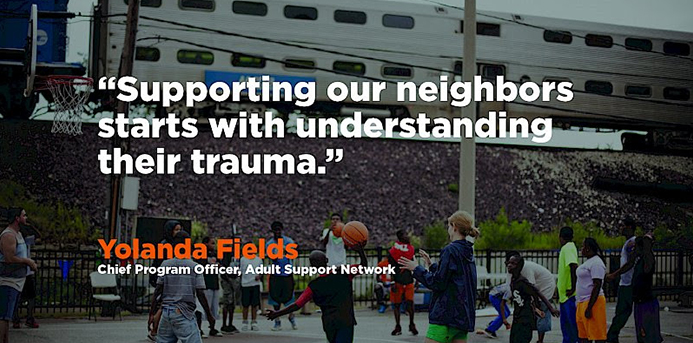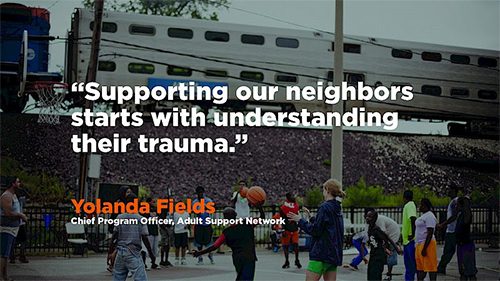
Yolanda Fields (Chief Program Officer, Adult Support Network) joined Breakthrough in 2003. Yolanda has been recognized for improving program processes and facilitating growth in individuals. Yolanda is also the Director of Women’s Ministry at New Landmark Missionary Baptist Church and sits on the board of the Advocate Charitable Foundation.
In communities across Chicago, families are thriving, industries are booming, and more opportunities are accessible. There are dozens of neighborhoods in this city being transformed, but there is still work to be done to ensure all neighborhoods and their residents are able to thrive in safe communities. When it comes to addressing the history and frequency of violence, it is important to consider the trauma people are experiencing and how that impacts neighborhood safety.
Trauma is an event or series of physically or emotionally harmful events that have lasting adverse effects on the individual’s mental, physical, social, emotional, or spiritual well-being. Childhood traumatic experiences have a tremendous impact on future violence victimization and perpetration, as well as lifelong health and opportunity. Per the Center for Disease Control, Adverse Childhood Experiences (ACEs) have been linked to chronic health conditions, low life potential, and early death. The more a child is exposed to trauma, the higher risk they are for these negative health outcomes. In addition to trauma, Breakthrough has found that many individuals experience co-occurring disorders, including substance abuse and mental illness, which makes it that much more difficult to achieve stability.
The effects of trauma on an individual can be devastating, but if you extrapolate those ramifications throughout an entire community, it can be catastrophic.
Because trauma is a prevalent factor in many of the issues challenging our community, Breakthrough implements this four-pronged approach in our interactions, facilities, and services:
- Realizing the prevalence of trauma
- Addressing trauma through prevention and intervention methods
- Resisting re-traumatization
- Ensuring our staff are trained and supported to provide trauma-informed care
Since Breakthrough joined the community in 2000, we have been dedicated to providing services that responded to trauma and were representative of the needs of East Garfield Park residents. With the housing market in disarray, we focused on services that would help our neighbors remain in stable homes and programs for temporary housing. As the price of healthy food grew over the years, we expanded our services to include the Fresh Market, which has distributed over 1 million pounds of fresh food since 2014.
Building on this model of trauma-informed care and listening to the community, Breakthrough convened with eight other community-focused outreach organizations as part of Communities Partnering 4 Peace (CP4P) — a city-wide collaboration aimed at reducing shootings, creating safe spaces, and professionalizing the violence prevention field. It is the first time many organizations and services have joined together to reduce violence in local communities through nonviolence and trauma-informed care.
CP4P targets individuals at highest risk of being perpetrators and victims of violence. Our approach includes creating authentic relationships in communities facilitated by local organizations skilled in and informed by peace, trauma, and wraparound services all facilitated by capable outreach workers who live and work in the communities they serve. This work is only possible with a deep understanding of the trauma that impacts the daily lives of individuals in East Garfield Park.
As members of the local community, we are elated to see our friends and neighbors thrive. We celebrate with them accomplishments like sending their last of three children to college or being elected to the local school council. We also mourn with them when life is lost to gun and street violence and are committed to partnering with them to create a safe, stable, and engaged community.
Through addressing trauma, we are able to help individuals in our community heal, develop new problem solving skills, and feel supported by developing roadmaps that engage, empower, and create supported individuals. This is key to helping people discover wellness at an individual and community level. Only through a trauma-informed lens, collaboration, and the pursuit of community wellness will we see recovery from trauma and revitalized communities.
More:


